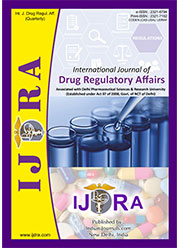Overview on Biopharmaceutics Classification System (BCS) based biowaiver requirements in African countries
Abstract
Biopharmaceutics Classification System (BCS)-based biowaiver are meant to reduce the need for establishing in vivo bioequivalence in situations where in vitro data may be considered to provide a reasonable estimate of the relative in vivo performance of two products.
The BCS is a scientific approach designed to predict medicinal absorption based on the aqueous solubility and intestinal absorptive characteristics of the Pharmaceutical product. To ensure interchangeability, the multisource product must be therapeutically equivalent to the comparator product. Types of in vivo equivalence studies include comparative pharmacokinetic studies, comparative pharmacodynamic studies and comparative clinical studies.
This article briefly explains the BCS based biowaiver requirements in six major African countries i.e. Zimbabwe, South Africa, Uganda, Kenya, Botswana and Tanzania which facilitates regulatory medicine approval process when the dossier (application) is approved based on evidence of equivalence other than In vivo studies.
Downloads
References
2. Guidelines on Submission of Documentation for Marketing Authorisation of a Pharmaceutical Product for Human Use [Internet]. Uganda: NDA [cited 2021 Mar 15]. Available from: https://www.nda.or.ug
3. Annex to Guidelines on Submission of Documentation for Registration of a multisource (Generic) Finished Pharmaceuticals Products [Internet]. Zimbabwe: MCAZ; 2009 Aug [cited 2021 Apr 12]. Available from: https://www.mcaz.co.zw
4. Shah VP, Rădulescu FS, Miron DS, Yacobi A. Commonality between BCS and TCS. International Journal of Pharmaceutics. [Internet]. 2016 Jul 25 [cited 2021 Apr 11]; 509 (1-2):35-40. Available from: https://www.sciencedirect.com/science/journal/03785173
5. Guideline for Bioavailability and Bioequivalence [Internet]. Botswana: MOH; 2015 Apr [cited 2021 Mar 31]. Available from: http://www.moh.gov.bw/
6. Guidelines on Therapeutic Equivalence Requirements [Internet]. Tanzania: TFDA; 2015 Jan [cited 2021 Mar 31]. Available from: http://www.tfda.or.tz/
7. Medicines Control Council, Biostudies [Internet]. South Africa: MCAZ; 2015 Jul [cited 2021 Mar 31]. Available from: http://www.mccza.com/
8. Guidelines-for-registration-of-Human-and-Veterinary-Medicines [Internet]. Kenya: Pharmacy Board Kenya; 2010 [cited 2021 Mar 15]. Available from: http://www.pharmacyboardkenya.org/
9. Sarkar A. Types of Biowaivers: A Discussion. Int J Drug Reg Affairs [Internet]. 2019 Sep 15 [cited 2021 Jun 15];7(3):14-0. Available from: http://ijdra.com/index.php/journal/article/view/329

This work is licensed under a Creative Commons Attribution-NonCommercial 4.0 International License.
The International Journal of Drug Regulatory affairs require a formal written transfer of copyright from the author(s) for each article published. We therefore ask you to complete and return this form, retaining a copy for your records. Your cooperation is essential and appreciated. Any delay will result in a delay in publication.
I/we have read and agree with the terms and conditions stated Page 2 of this agreement and I/we hereby confirm the transfer of all copyrights in and relating to the above-named manuscript, in all forms and media, now or hereafter known, to the International Journal of Drug Regulatory affairs, effective from the date stated below. I/we acknowledge that the IJDRA is relying on this agreement in publishing the above-named manuscript. However, this agreement will be null and void if the manuscript is not published in the IJDRA.
Download link for COPYRIGHT FORM







